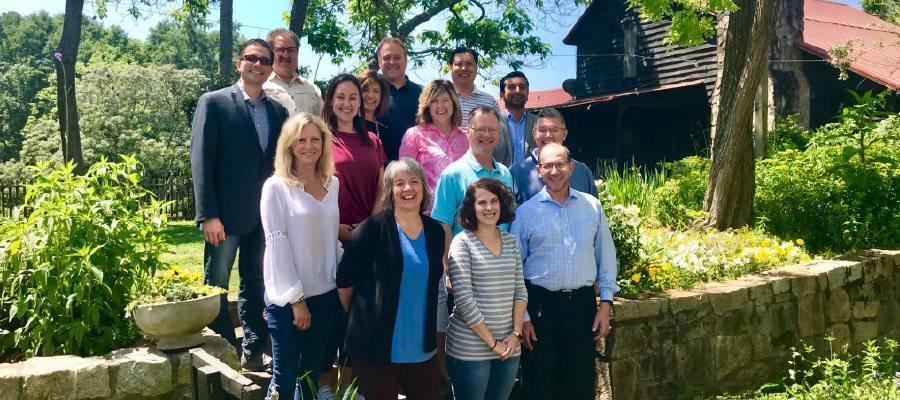Physician Leadership Experience addresses clinician burnout and self-care

Pictured: The Physician Leadership Experience group in Atlanta in May 2018 with Carrie Saia (pink shirt) and Erin Locke (maroon shirt).
Health care providers who attend AHA’s Physician Leadership Experience, which occur twice a year in different cities nationwide, often return to work refreshed and committed to improving care for patients. We spoke to two health care leaders to see why this opportunity resonated with them and how they are still applying the lessons learned. Consider joining one of the 2020 Leadership Experiences – April 1-3 in Charlotte, NC or October 28-30 in Colorado Springs, Colo. Learn more at aha.org/physicians.
Q: How did you learn about the Physician Leadership Experience, and what has the opportunity meant to you?
Carrie Saia: I learned about the opportunity through participating in a state-level initiative looking at growing physician leaders. I was interested after successfully recruiting a new physician to our practice after losing two physicians to burnout. Luckily, I was able to convince my new physician to attend the workshop with me in Atlanta in May 2018. She learned so much about herself that has impacted both her personal and professional life, and we also grew closer together as a team.
Erin Locke: I first learned about the experience from Carrie, my CEO, and did not know a thing about what to expect until the first activities were emailed out. I quickly realized that to benefit from the experience, I would need to allow myself to be vulnerable.
It was a small group that attended, and in a short period of time we felt invested in each other’s growth. The leaders really helped to guide the group, and there was a lot of trust because we could tell they knew what they were doing.
Q: What lessons did you learn that surprised you?
CS: The biggest lesson I learned was about myself and what recharges/motivates me. I cannot imagine going through the last year without having this invaluable insight into myself. I’m an extremely happy person, but also have higher levels of energy and passion because of attending.
We are going through a major expansion and have held numerous community meetings in this last year, along with significant financial challenges. This experience helped me learn to eat healthier, exercise more and journal more often. I completely understand now how much taking care of me means, and how it impacts those around me more.
EL: What surprised me the most about the experience was the absence of a focus on the participants as health care providers. We spent our time instead focusing on our needs outside of work, on our relationships and personal health, etc. It was a time to reset and prioritize ourselves as people first and health care providers second.
One of the lessons that I learned is that I am actually at my best as a health care provider when I am prioritizing myself as an individual above my work.
Before we left the experience, we completed Core Declarations as goals to continue moving forward. These goals would be different for everyone, but I knew I wanted to continue the work that was started, so I established with a therapist and continue to meet routinely. It has now been 18 months, and my personal relationships are very strong, I eat healthier and I have an active life outside of work.
The challenges at work have not changed, but my ability to handle them has improved.
Q: What advice would you give to other clinicians?
CS: One of the main reasons I wanted to attend was because I want to work another 10-15 years and do so with great passion while feeling less jaded/burned out.
I would encourage clinicians, especially those working in rural areas, to find out what is important to them at their core, and how they can continue to feed those important values and turn them into strengths.
I think the younger clinicians understand this and strive harder for a better work/life balance. But I’m not certain that they take time to reflect on what values are most important to them and to understand how those values are able to be used to reenergize themselves.
EL: The advice I would give is that it is okay to take care of yourself, and I would encourage health care providers to focus on their own health and to be good role models for their patients.
In addition, rural organizations face unique challenges facing their communities. Perhaps two of the greatest challenges to rural providers is first the shortage of rural providers, and second the distance to specialty providers. This can place a strain on rural providers who may not have the time away from work that they require and/or who may be managing health care conditions beyond what they are comfortable managing.
Rural medicine is also extremely rewarding, as those who care for one another in a small community know. Although the Physician Leadership Experience cannot modify those challenges in the rural communities, I believe it can help providers to feel empowered while facing them.

